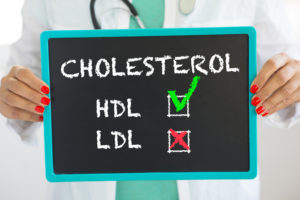 HDL cholesterol, otherwise known as “good cholesterol,” has been shown to lower the risk of heart attack and stroke. For many years, HDL cholesterol has been the focus of many studies, which have demonstrated its role in moving fats and other cholesterol molecules out of artery walls. These studies have also shown that people with higher HDL cholesterol levels tend to have lower rates of cardiovascular disease.
HDL cholesterol, otherwise known as “good cholesterol,” has been shown to lower the risk of heart attack and stroke. For many years, HDL cholesterol has been the focus of many studies, which have demonstrated its role in moving fats and other cholesterol molecules out of artery walls. These studies have also shown that people with higher HDL cholesterol levels tend to have lower rates of cardiovascular disease.
A new study from UT Southwestern scientists has analyzed data on more than 15,000 people to better understand the relationship between HDL cholesterol and cardiovascular events in diverse populations. In previous studies, the population has been looked at as a whole, not taking into account race or gender. For this research, the number of HDL particles was used as a metric to measure heart attack and stroke risk.
Advertisement
“Previous studies have looked at HDL levels in the population as a whole,” says Anand Rohatgi, M.D., an associate professor of internal medicine at UTSW. “But we know that sometimes biology differs by gender and race, so we thought it was important to separately tease apart what’s happening in those populations, as well as how HDL is associated with stroke, which has been understudied.”
In this new study, published in the journal Circulation, Rohatgi and his colleagues pooled together information on people who had participated in four large nationwide studies. This included the Dallas Heart Study, Atherosclerosis Risk in Communities Study, Multi-Ethnic Study of Atherosclerosis, and the Prevention of Renal and Vascular Endstage Disease study. Overall, the studies included 15,784 people who were followed over an average of 8 to 12 years. Of these participants, 22 percent were black, 54 percent were male, and their average age was 56 years.
“By combining all these large existing cohorts, we had enough numbers to look at these populations that had been understudied in the past,” says Kavisha Singh, M.D., a research fellow in cardiology at UTSW and first author of the new study.
More Reduction In Women
The study found that overall, participants with the highest HDL-P levels, above 37 mmol/L, had a 37 percent lower risk of heart attack and a 34 percent lower risk of stroke than those who had the lowest HDL-P levels. HDL-P levels tally how many particles of HDL are circulating in the blood.
In women, this association was stronger, finding that those with the highest HDL-P levels had a 49 percent reduction in heart attacks and a 46 percent reduction in stroke. While HDL-C predicted heart attack risk in the overall pool of people as well as in women, it was not associated with stroke.
When the researchers concentrated on black participants, the results were entirely different, neither HDL-C nor HDL-P was linked to a risk of a heart attack.
“If you’re white, low HDL cholesterol is still a powerful predictor of heart attack and stroke risk, and that has not changed,” says Rohatgi. “But if you’re not white, it’s not that straightforward.”
Advertisement
As researchers advance information about HDL cholesterol, they are able to predict how it relates among populations.
“These risk markers are really relevant in everyday primary care and cardiology,” says Singh. “Doctors use cholesterol levels to make decisions like whether a patient goes on medication or not.”
More than 12 percent of adults in the U.S. have high cholesterol, and more than 18 percent have low levels. Research is needed to better understand the relationship between both “good cholesterol” and “bad cholesterol” and how it affects other illnesses and diseases in the body. The research team is planning future studies on the functionality of HDL particles among black people. They will also outline how HDL-P may be used clinically and whether HDL-P might be associated with specific subtypes of strokes.
